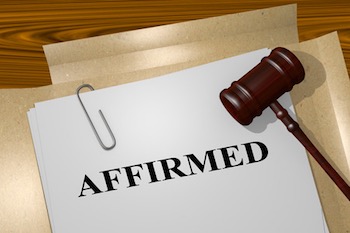“The Federal Circuit explained that by ‘virtue of the reformation, the written instrument was corrected nunc pro tunc, to the point of the assignment.’”
 On May 13, 2020, the United States Court of Appeals for the Federal Circuit (CAFC) upheld a decision of the United States District Court for the District of Minnesota in Schwendimann v. Arkwright Advanced Coating, Inc. In particular, the CAFC affirmed the District Court’s holding that Jodi A. Schwendimann was a patentee entitled to pursue infringement claims despite the patent assignment being improperly recorded at the time the infringement action was filed.
On May 13, 2020, the United States Court of Appeals for the Federal Circuit (CAFC) upheld a decision of the United States District Court for the District of Minnesota in Schwendimann v. Arkwright Advanced Coating, Inc. In particular, the CAFC affirmed the District Court’s holding that Jodi A. Schwendimann was a patentee entitled to pursue infringement claims despite the patent assignment being improperly recorded at the time the infringement action was filed.
Background and District Court Proceedings
Schwendimann was an employee of American Coating Technologies, Inc. (ACT), from 1992 until ACT ceased operations in 2001. During her employment, Schwendimann filed two patent applications directed to image transferring sheets, i.e. U.S. Patent Application Nos. 09/150,983 (the ’983 application) and 09/541,845 (the ’845 application). Schwendimann was named an inventor in each of the applications, which were assigned to ACT. When ACT ceased operations in 2001, it owed significant debt to Schwendimann for wages and sales commission. It also owed significant legal fees to the firm Schwegman, Lundberg & Woessner, P.A. (SLW) for the preparation and prosecution of ACT’s patent applications. Schwendimann and ACT reached an agreement that the debt owed to Schwendimann would be settled if ACT assigned its patent applications, including the ‘983 and ‘845 applications, to Schwendimann. In turn, Schwendimann agreed to take over payments and settle the debt owed to SLW.
In 2003, a signed assignment for the ‘983 application was filed with the USPTO. However, when the assignment for the ‘845 application was filed it was improperly filed as a Hand-Altered Copy of the ’983 assignment. All information on the Hand-Altered Copy related to the ‘983 application except for the client reference number. Regardless, the USPTO accepted the filing and recorded the assignment to Schwendimann for the ‘845 application.
In 2011, Schwendimann filed a complaint against Arkwright for infringement of the patents-in-suit, including the patent that resulted from the ‘845 application. In response, Arkwright filed a Motion to Dismiss for Lack of Jurisdiction on the grounds that Schwendimann did not own the ‘845 application. For the first time Schwendimann became aware that the assignment was incorrectly filed and, thus, took action to correct the assignment by filing a new assignment with the USPTO. The District Court denied Arkwright’s motion and determined that the Hand-Altered Copy constituted an “instrument in writing” pursuant to 35 U.S.C. § 261 (2006). Following additional discovery regarding whether Hand-Altered Copy constituted a valid assignment of the ‘845 application, the District Court granted a motion for summary judgment filed by Schwendimann on standing. A judgment of willful infringement was entered against Arkwright and Schwendimann was awarded $2,624,228.00 in damages.
CAFC Reviews District Court’s Analysis of the Hand-Altered Copy
Initially, citing Lexmark v. Static Control Components, the CAFC noted that a court has both the statutory and constitutional authority to adjudicate a matter as long as a plaintiff alleges facts that support an arguable case or controversy under the Patent Act. The CAFC further noted that there was no “standing issue” to be decided in the appeal since Schwendimann’s complaint contained an arguable case or controversy, i.e. that she was the owner of the ‘845 application by way of the Hand-Altered Copy and that Arkwright infringed the resulting patent. Thus, the CAFC explained that the only questions at issue were 1.) whether Schwendimann was a patentee at the time the infringement action was filed, and 2.) whether the assignment was a written instrument in accordance with 35 U.S.C. § 261.
The CAFC noted that only a “patentee” may pursue an infringement action and in order to “confer patentee status to the assignee, an assignment must be documented in an ‘instrument in writing [,]’ but there are no form or content requirements for the written instrument specified in … [35 U.S.C. § 261].” Further, the CAFC noted that a plaintiff must also have legal title to the patent or patent application, which is a question to be determined exclusively by the state courts. The CAFC explained that “[u]nder Minnesota law, contracts are construed consistent with the parties’ intent and, where a written contract does not accurately reflect the parties’ intentions, a court may reform the contract to reflect the parties’ intentions.”
The CAFC agreed with the District Court that Schwendimann was a patentee entitled to sue for infringement at the time she filed her complaint. The CAFC noted that the District Court properly concluded that the 2002 Hand-Altered Copy properly granted title of the ‘845 application to Schwendimann. The CAFC supported that conclusion by noting that the parties’ conduct, such as Schwendimann’s payment of ACT’s outstanding debts and informing counsel of the intent to assign, reaffirmed the parties’ intention to assign the rights to the ‘845 patent to Schwendimann. The CAFC further explained that the Hand-Altered Copy filed by SLW failed to express the parties’ true intentions due to a mutual mistake of fact. Thus, the CAFC stated “the District Court properly reformed the Hand-Altered Copy as an assignment for the ’845 application and determined that Ms. Schwendimann was the ‘patentee’ as of the date that the handwritten instrument was submitted to the USPTO.”
The CAFC further noted that when a court reforms a contract, as done by the District Court, the court assures that the written instrument reflects the parties’ agreement and is effective as of the date of the original agreement. The CAFC explained that by “virtue of the reformation, the written instrument was corrected nunc pro tunc, to the point of the assignment.” Thus, the CAFC concluded that the District Court was correct in holding that Schwendimann was a patentee entitled to pursue an infringement claim for the patent resulting from the ‘845 application at the time the action was filed.
Dissenting Opinion by Judge Reyna
In a dissenting opinion, Judge Reyna noted that the “jurisprudence on standing is clear” and the majority’s opinion obscured the principle that “[p]ost-suit activities cannot confer Article III standing that was otherwise lacking when the suit was filed.” Reyna also noted that the jurisdictional issue was constitutional, not merely statutory, and if a party does not have Article III standing, the case must be dismissed. Noting that the District Court determined the Hand-Altered copy did not convey any rights to the ‘845 application, Reyna asserted that the District Court should have dismissed Schwendimann’s complaint for lack of Article III standing because on the day the suit was filed, Schwendimann had no enforceable, exclusionary rights in the ‘845 application.
Reyna also explained that the District Court improperly bypassed a constitutional standing issue by reforming the Hand-Altered Copy and retroactively granting Schwendimann rights in the ‘845 application. Citing Abraxis Bioscience, Inc. v. Navinta LLC, Reyna noted that “the plaintiff is required to have at least some enforceable, exclusionary rights “to the patents on the day it filed the complaint and that requirement cannot be met retroactively”. Furthermore, Reyna explained that the majority improperly permitted Minnesota state contract law to “retroactively override federal law (Section 261) in order to confer standing in federal court.” Reyna concluded by noting that the majority decision and the district court’s standing determination resulted in a substantial waste of resources, created uncertainty for litigants going forward, and created a new “exception for the retroactive state law remedy of reformation [that] opens the door for similar exceptions for other retroactive state law doctrines.”

![[IPWatchdog Logo]](https://ipwatchdog.com/wp-content/themes/IPWatchdog%20-%202023/assets/images/temp/logo-small@2x.png)

![[[Advertisement]]](https://ipwatchdog.com/wp-content/uploads/2023/01/2021-Patent-Practice-on-Demand-1.png)
![[Advertisement]](https://ipwatchdog.com/wp-content/uploads/2024/04/UnitedLex-May-2-2024-sidebar-700x500-1.jpg)
![[Advertisement]](https://ipwatchdog.com/wp-content/uploads/2024/04/Artificial-Intelligence-2024-REPLAY-sidebar-700x500-corrected.jpg)
![[Advertisement]](https://ipwatchdog.com/wp-content/uploads/2024/04/Patent-Litigation-Masters-2024-sidebar-700x500-1.jpg)

![[Advertisement]](https://ipwatchdog.com/wp-content/uploads/2021/12/WEBINAR-336-x-280-px.png)
![[Advertisement]](https://ipwatchdog.com/wp-content/uploads/2021/12/2021-Patent-Practice-on-Demand-recorded-Feb-2021-336-x-280.jpg)
![[Advertisement]](https://ipwatchdog.com/wp-content/uploads/2021/12/Ad-4-The-Invent-Patent-System™.png)






Join the Discussion
No comments yet.